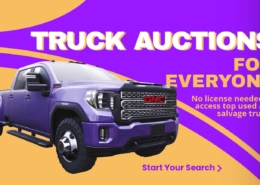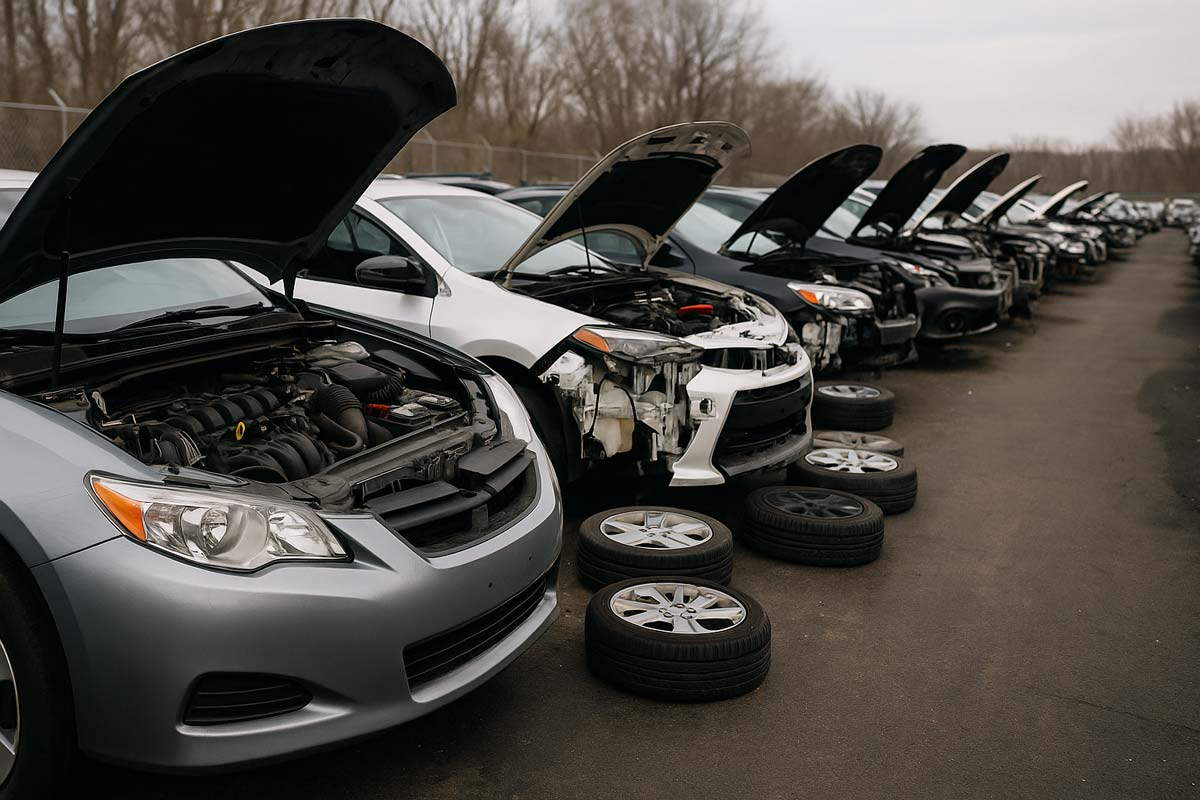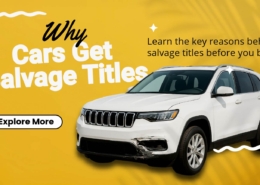 https://auction.ridesafely.com/images/2018/10/banner-truck-auctions-for-everyone.jpg
865
1440
RideSafely
/images/2025/01/ridesafely-logo.svg
RideSafely2025-09-26 12:10:232025-09-26 14:53:10How to Buy Your Next Truck at an Auto Auction
https://auction.ridesafely.com/images/2018/10/banner-truck-auctions-for-everyone.jpg
865
1440
RideSafely
/images/2025/01/ridesafely-logo.svg
RideSafely2025-09-26 12:10:232025-09-26 14:53:10How to Buy Your Next Truck at an Auto AuctionWhen dealing with a totaled car, many vehicle owners overlook the hidden potential lying within. A car deemed irreparable by insurance companies can still harbor numerous salvageable parts, each possessing substantial resale value. This guide meticulously explores the most valuable automotive components that can be extracted, resold, or reused from a totaled vehicle, enabling car owners, mechanics, and auto enthusiasts to capitalize on these overlooked opportunities.
Which Vehicles Are Most Fit for Parts Only?
When shopping online for parts-only vehicles, keep an eye out for listings with phrases like “CO Bill of Sale – Parts Only (No Title),” “FL Certificate of Destruction,” “WA Bill of Sale (No Title),” or “IN Bill of Sale (No Title).” These labels signal that the vehicle is being sold without a title and is legally restricted to parts use only.
Vehicles with this designation can’t be rebuilt or registered for road use in the U.S.—but that doesn’t mean they’re without value. In fact, they can be a goldmine of valuable components, especially for mechanics, dismantlers, exporters, restorers, or DIY enthusiasts searching for hard-to-find parts.
Engine and Transmission: The Heart and Soul of Any Vehicle
Arguably, the engine and transmission remain the most coveted salvageable components in a totaled car. Engines, particularly those with fewer miles and regular maintenance history, are valuable commodities in the auto-parts market. Engines from popular brands like Toyota, Honda, BMW, or Mercedes-Benz command premium resale prices, particularly if they are intact and operational post-collision.
Similarly, automatic and manual transmissions can fetch significant sums if undamaged. Transmissions, notably from vehicles known for their durability and performance, such as trucks, SUVs, and luxury cars, remain high-demand items.
Before stripping your vehicle for valuable components, it’s smart to first explore the diverse range of vehicles available at RideSafely. You may find a better option to rebuild, part out, or resell.
Electronic Components: Tech Treasures Awaiting Extraction
Modern vehicles heavily depend on advanced electronics. Infotainment systems, GPS navigation units, and backup cameras often remain intact following an accident. OEM multimedia systems, particularly from luxury brands like Lexus, Audi, or Tesla, can command impressive prices on the used market.
Additionally, Electronic Control Units (ECUs), sensors, alternators, starters, and vehicle security modules, if unaffected by the crash, can significantly boost the return on salvage operations.
Catalytic Converters: Precious Metals Inside Your Exhaust System
Catalytic converters contain precious metals such as palladium, platinum, and rhodium, making them among the most valuable parts to salvage. The value of catalytic converters varies significantly depending on the vehicle’s make, model, and year, but hybrids and vehicles from high-end manufacturers often possess converters with higher metal concentrations, dramatically enhancing their salvage worth.
If you’re new to salvaging, consider checking out our guide on salvage car auctions and how to turn profits while you learn — perfect for first-time buyers aiming to make informed decisions.
Wheels, Tires, and Rims: Rolling Out Profits
Quality wheels and tires often survive collisions unscathed, especially rear wheels in front-impact crashes or vice versa. Alloy wheels from brands like Ford, Chevrolet, BMW, and Mercedes-Benz attract buyers seeking factory-original replacements. Premium tire brands such as Michelin, Bridgestone, and Continental also retain considerable resale value if they demonstrate adequate tread depth and minimal wear.
Body Panels and Exterior Components: Valuable Even After Collision
Panels from popular models, including doors, hoods, trunks, and fenders, represent a significant salvage opportunity. Often, vehicles declared totaled suffer damage localized to specific areas, leaving other body panels unaffected. These intact panels can yield a lucrative return, especially when from high-demand vehicles or luxury brands. Mirrors, grilles, and headlights, especially LED or Xenon types, are equally valuable.
Interior Elements: Hidden Opportunities Within the Cabin
Interior components such as seats, airbags, dashboards, steering wheels, and infotainment displays offer substantial salvage value. Leather interiors from high-end manufacturers, such as Lexus, Porsche, or Mercedes-Benz, particularly if undamaged, can command premium resale prices. Airbags, when intact and un-deployed, also retain high market values due to their critical role in vehicle safety and the high cost of new replacements.
Battery Packs: Especially from Hybrid and Electric Vehicles
With the surge in electric vehicles (EVs) and hybrids, battery packs have become immensely valuable salvage items. Lithium-ion batteries from Tesla, Toyota Prius, Chevrolet Volt, and similar models can be repurposed, refurbished, or resold at considerable profit margins, even when their original vehicles are irreparable.
Looking for hidden gems? Don’t overlook government and police impounds. Our detailed guide to finding and buying impounded cars can help you source undervalued vehicles with major profit potential. Also, learn why more buyers are choosing electric cars at auction.
Brake Systems: Critical Components with Robust Resale Potential
Brake calipers, rotors, and anti-lock braking systems (ABS) remain sought-after parts, particularly if recent replacements or upgrades were performed pre-accident. High-performance brake systems from sports cars and luxury vehicles can significantly enhance the salvage returns due to their elevated aftermarket appeal.
Suspension Systems: Stability and Value Combined
Suspension components such as struts, shocks, control arms, and coil springs frequently survive collisions. These parts, particularly from vehicles designed for performance or rugged utility, offer noteworthy salvage opportunities. Trucks, SUVs, and off-road vehicles often yield highly marketable suspension parts.
Fuel Systems: Underrated Yet Highly Valued Salvage Items
Fuel pumps, injectors, and fuel tanks, particularly from newer models and luxury vehicles, remain profitable salvage targets. Fuel injectors from diesel and high-performance vehicles are especially valuable, as their replacement cost is generally substantial, thereby boosting the market value of these used components.
Valuable Parts Salvage Workflow
| Salvageable Part Category | Specific Components | Potential Usage |
|---|---|---|
| Engine & Transmission | Engines, Automatic/Manual Transmissions | Resale or reuse in other vehicles |
| Electronic Components | Infotainment Systems, GPS Units, ECUs, Sensors, Alternators, Starters | Resale, repairs, replacements |
| Catalytic Converter | Catalytic Converters containing precious metals (Platinum, Palladium, Rhodium) | Recycling and resale due to high scrap value |
| Wheels & Tires | Alloy Wheels, Tires (especially premium brands) | Resale, reuse, replacement parts |
| Body Panels | Doors, Hoods, Trunks, Fenders, Mirrors, Grilles, Headlights | Resale as replacement parts |
| Interior Components | Seats, Airbags, Dashboards, Steering Wheels, Infotainment Screens | Resale, reuse, repair replacements |
| Battery Packs | Lithium-ion Batteries (Hybrids & EVs) | Resale, refurbishment, reuse in other vehicles or storage systems |
| Brake Systems | Calipers, Rotors, ABS Systems | Resale, reuse in repairs |
| Suspension Systems | Struts, Shocks, Control Arms, Coil Springs | Resale, reuse in other vehicles or replacements |
| Fuel Systems | Fuel Pumps, Injectors, Fuel Tanks | Resale, reuse for repairs and maintenance |
How to Maximize Value from Salvaged Car Parts
To maximize profits from salvaging a totaled vehicle, we recommend adhering to these practical guidelines:
- Careful Extraction: Utilize professional tools and certified technicians to ensure parts remain undamaged during removal.
- Proper Documentation: Clearly record all available details (model, year, mileage, VIN) to establish authenticity and maximize resale credibility.
- Market Research: Accurately price each component by researching current market demands and prices across various online platforms, including eBay Motors, Craigslist, specialized auto parts marketplaces, and salvage yards.
- Condition Inspection: Professionally inspect parts for functionality and safety before reselling. Offering tested and verified components drastically increases customer confidence and willingness to pay premium prices.
- Effective Marketing: List components with detailed photographs, comprehensive descriptions, and competitive pricing strategies to attract targeted buyers swiftly.
Not all damage is equal. To ensure you salvage the right components, learn how to interpret listings with our buyer’s guide to understanding damage codes.
Buying salvage cars at the right price is key to maximizing returns. At RideSafely, you can buy cars at wholesale auctions without a dealer license, making it accessible for everyday buyers.
Conclusion: Turning Loss into Lucrative Opportunities
A totaled vehicle need not equate to total loss. Strategic salvage of valuable automotive components presents an overlooked yet exceptionally profitable opportunity. From catalytic converters and electronic modules to premium wheels and intact interiors, numerous parts can be harvested and resold, significantly offsetting any financial impact associated with vehicle loss.
Implementing thoughtful extraction, accurate documentation, and targeted marketing enhances these components’ resale potential, thereby maximizing your returns in the automotive salvage market.
Frequently Asked Questions About Salvaging Car Parts
What are the most valuable parts to salvage from a totaled car?
The most valuable parts typically include the engine, transmission, catalytic converter, battery pack (especially in EVs), wheels, infotainment systems, and airbags. These components often retain significant resale value even after an accident.
Can I legally sell parts from a totaled vehicle?
Yes, in most states, you can legally sell parts from a totaled car as long as you own the vehicle or have legal rights to its disposal. Always check your local regulations and ensure proper documentation.
How do I know if a part is still usable after a crash?
Visual inspection isn’t enough. Test electrical components and have mechanical parts professionally inspected. If in doubt, refer to damage codes or get a mechanic’s opinion to avoid selling faulty items.
Where can I sell salvaged auto parts for the best price?
You can sell salvaged parts through online marketplaces like eBay Motors, Facebook Marketplace, Craigslist, or local junkyards. Specialized auto forums and parts resellers may also offer competitive prices.
What is the best place to buy salvage cars for parts?
Platforms like RideSafely offer access to wholesale salvage vehicles without needing a dealer license. This makes it easier for individuals to find profitable cars for dismantling.






Leave a Reply
Want to join the discussion?Feel free to contribute!